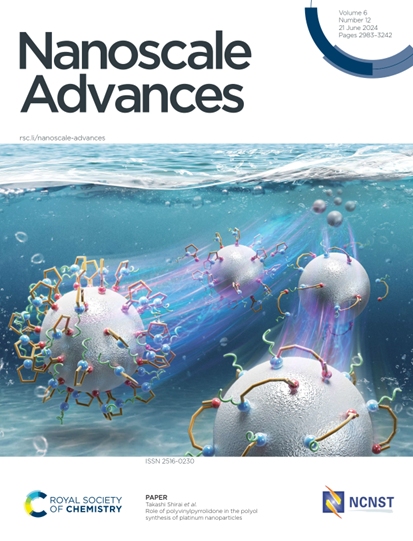The newest research paper of Associate Professor Takashi SHIRAI's group has been highlighted as the FRONT COVER of the latest issue of Nanoscale Advances
Category:News|Publishing : June 20, 2024
The newest research paper of Associate Professor Takashi SHIRAI's group has been honored and highlighted as the FRONT COVER of the latest issue of Nanoscale Advances, a peer-reviewed scientific journal that published by Royal Society of Chemistry. The paper entitled with「Role of polyvinylpyrrolidone in the polyol synthesis of platinum nanoparticles」reported the influence of surface passivation agent on metal particles formation mechanism in polyol process. The paper was authored by Assistant Professor Yunzi XIN(Department of Engineering (Life Science and Applied Chemistry)), Mr. TakuNAGATA(Previous master student: Department of Life Science and Applied Chemistry), Assistant Professor Kunihiko KATO(Department of Engineering (Life Science and Applied Chemistry)), Assistant Professor Yuping XU(Department of Engineering (Life Science and Applied Chemistry)), Associate Professor Takashi SHIRAI(Department of Engineering (Life Science and Applied Chemistry)).

Metal nanoparticles (NPs) have attracted global interest in various applications, such as energy conversion, air and water purification, sensing, and medicine, owing to their extraordinary chemical and physical properties. Metal nanoparticles with altered size and morphology have been numerously prepared via different synthetic approaches. In particular, the synthesis of metal nanoparticles via liquid-phase polyol reaction has attracted worldwide attention as one of the most facile approaches. Since the multivalent alcohols utilized in polyol reaction possess high polarity and boiling point, various the metal salts precursors can be dissolved and then reduced into metal nanoparticles at a relatively lower temperature even under the boiling point. During polyol synthesis of metal nanoparticles, the surface passivation agent (also known as capping agent, surfactant) plays an important role in preventing the aggregation and agglomeration of formed particles、as well as size and morphology controlling. Polyvinylpyrrolidone (PVP), is one of the most popular surface passivation agents that utilized in polyol system, due to its non-toxicity and non-ionic nature. In present work, platinum (Pt)nanoparticles were synthesized under altered PVP/Pt-ion molar ratio. The hydrodynamic size of synthesized Pt nanoparticles in different solvents, the crystal structure, solid-phase size and morphology, as well as the surface chemical state and thermal stability of passivated PVP, the reduction behavior and dynamic of Pt-ion in synthesis stage were elucidated systemically, during where the role of PVP in Pt nanoparticle formation and mechanism in size/surface structure controlling were also clarified in detail.
Title: Role of polyvinylpyrrolidone in the polyol synthesis of platinum nanoparticles
Authors:Yunzi Xin, Taku Nagata, Kunihiko Kato, Yuping Xu, and Takashi Shirai *
*Corresponding author
Article information: DOI: doi.org/10.1039/D4NA00118D
Bus Tour to Toyota Automobile Museum and Sanshu Asuke Yashiki was held. Four faculty members in charge of international exchange from the Valencian Polytechnic University in Spain visited NITech.

 Japanese
Japanese